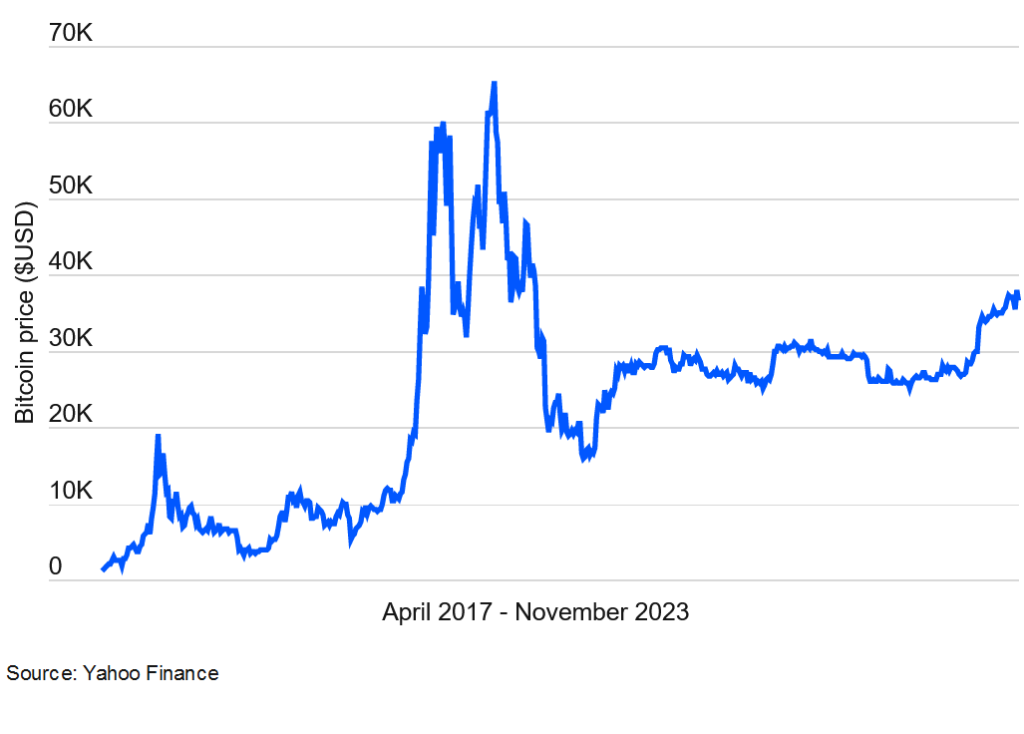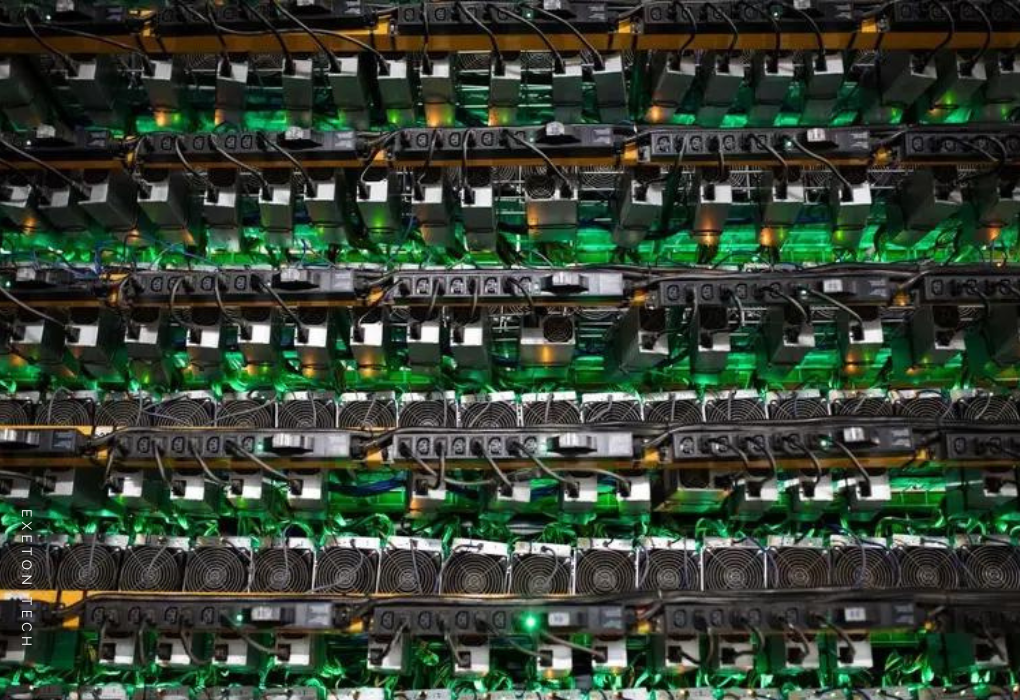Bitcoin mining involves generating new bitcoins by solving complex mathematical problems that validate transactions in the digital currency. This process rewards miners with a specific amount of bitcoin upon successful mining.
Bitcoin, a well-known cryptocurrency, has attracted significant attention due to its dramatic fluctuations in value and substantial appreciation since its inception in 2009.
With the soaring prices of cryptocurrencies, particularly Bitcoin, there has been a growing interest in mining activities. However, the reality of Bitcoin mining is challenging for most individuals due to its sophisticated requirements and substantial expenses. Let’s explore the fundamentals of Bitcoin mining and some important risks to consider.
Bitcoin mining statistics

Understanding Bitcoin
Bitcoin represents a prominent form of cryptocurrency, a digital currency that operates entirely online. It utilizes a decentralized network of computers, also known as a distributed ledger, to monitor its transactions. This system involves a process where networked computers, referred to as miners, validate and process transactions. Through this process, new bitcoins are generated, a procedure commonly known as mining. Miners receive Bitcoin as compensation for their transaction processing efforts.
The core technology behind Bitcoin, and many other cryptocurrencies, is blockchain. This technology is essentially a decentralized record of all transactions over a network. Each group of verified transactions forms a block. These blocks are then linked together, creating a continuous chain. This chain serves as a comprehensive, ongoing public record, akin to an extensive, ongoing receipt. The act of adding a block to this chain is what constitutes Bitcoin mining.
How Bitcoin mining works
Bitcoin mining involves a competitive race to solve complex mathematical puzzles that necessitate high-end computers and significant electricity consumption. The objective for miners is to be the first to determine the correct or nearest solution to a specific problem. This method, known as “proof of work,” requires miners to make numerous rapid guesses to identify the correct hash, demanding substantial computational resources. The challenge intensifies as more participants enter the network.
Specialized hardware, called application-specific integrated circuits (ASICs), is essential for this operation. These ASICs, potentially costing upwards of $10,000, are notorious for their high energy usage, attracting environmental concerns and impacting the financial gains of mining operations.
Successful miners are compensated for adding a block to the blockchain. As of the current system, this reward stands at 6.25 bitcoins per block. This bounty halves approximately every four years, or after every 210,000 blocks. In November 2023, with Bitcoin’s value at about $36,400, the reward of 6.25 bitcoins equates to approximately $227,500.

Is Bitcoin mining profitable?
Bitcoin mining, while potentially lucrative, comes with significant financial risks due to the substantial initial investment in hardware and the continuous cost of power consumption. A single ASIC miner’s energy requirement is equivalent to around half a million PlayStation 3 consoles, based on a 2019 Congressional Research Service report.
The escalating difficulty in mining Bitcoin has led to an increased demand for computational resources. This activity now uses approximately 147 terawatt-hours annually, surpassing the electricity usage of many nations, as indicated by the Cambridge Bitcoin Electricity Consumption Index. To mine a single Bitcoin, it would take about nine years of electricity consumption for an average American household, based on data from August 2021.

Source: Cambridge Bitcoin Electricity Consumption Index
Bitcoin mining can be a costly endeavor, especially when undertaking it solo due to the high expenses associated with the process. To mitigate some of these costs, many miners opt to join forces in what’s known as a mining pool. These pools enable participants to combine their computing power, enhancing their chances of successfully mining Bitcoin. However, this collaborative effort also means that any rewards are divided among the members, potentially reducing individual earnings.
How do you start Bitcoin mining?
Here are the basics you’ll need to start mining Bitcoin:
- Wallet. For those who engage in Bitcoin mining, the rewards obtained are stored in digital wallets. These wallets are secure, encrypted online accounts that facilitate the storage, sending, and receiving of Bitcoin or other digital currencies. Various companies offer such wallet services, including well-known names like Coinbase, Trezor, and Exodus.
- Mining software. The software required for Bitcoin mining is another critical component of the setup. There are numerous mining software options available, many of which are complimentary and compatible with both Windows and Mac operating systems. Once installed and linked with the necessary hardware, this software enables the mining of Bitcoin.
- Computer equipment. However, the most significant barrier to Bitcoin mining is often the hardware. Mining Bitcoin requires a high-powered computer system, which not only comes with a hefty price tag, often exceeding $10,000, but also consumes a substantial amount of electricity. This high cost and energy consumption make Bitcoin mining a challenging and expensive operation.
Risks of Bitcoin mining
- Price volatility. Bitcoin has experienced significant fluctuations in value since its introduction in 2009, exhibiting a wide price range, including a drop below $20,000 and a surge close to $69,000 since November 2021. This volatility poses challenges for miners in predicting whether their rewards will compensate for the substantial expenses associated with mining.
- Regulation. Most governments have not fully embraced cryptocurrencies like Bitcoin, often viewing them with suspicion due to their operation outside of state control. There’s a persistent risk that governments could ban Bitcoin mining or cryptocurrencies entirely, as seen in China’s 2021 prohibition, which was attributed to financial risks and an increase in speculative trading.
Bitcoin price volatility
The value of Bitcoin has been highly unstable, reaching peak levels in 2020 and 2021, followed by a sharp decline in 2022 in response to rising interest rates. However, it has regained some ground in 2023.

Taxes on Bitcoin mining
Tax implications are a crucial aspect to consider in Bitcoin mining. The IRS is increasingly scrutinizing cryptocurrency owners and traders following the significant rise in asset values in recent years. For those in the Bitcoin mining business, expenses may be deductible for tax purposes, with revenue being the value of the mined bitcoins. However, if mining is a mere hobby, it’s unlikely that expenses can be deducted.
- Are you a business? The successful mining of Bitcoin or other cryptocurrencies results in the fair market value of these currencies being taxed as ordinary income at the time they are received. Additionally, selling bitcoins at a higher price than their acquisition cost is considered a capital gain, subject to taxation similar to traditional assets like stocks or bonds.
- Mined bitcoin is income. Despite the allure of Bitcoin mining, it is a challenging and costly endeavor to undertake profitably. The extreme price volatility of Bitcoin further complicates this activity.
- Capital gains. If you sell bitcoins at a price above where you received them, that qualifies as a capital gain, which would be taxed the same way it would for traditional assets such as stocks or bonds.
Check out ExetonTech’s cryptocurrency tax guide to learn about basic tax rules for Bitcoin, Ethereum and more.
Conclusion
It is essential to recognize that Bitcoin is a speculative asset without inherent value, meaning it doesn’t generate anything for its owner and isn’t linked to a tangible asset like gold. Returns depend on selling it at a higher price, but there is no guarantee that this price will be sufficient to yield a profit.


3 thoughts on “What is Bitcoin mining and how does it work?”